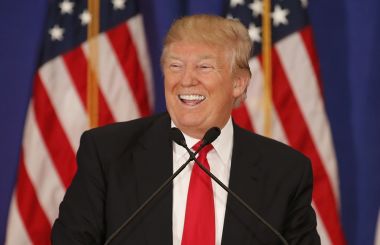Trump wins races in 3 states — Michigan, Mississippi, Hawaii — as Cruz takes Idaho; Sanders upsets Clinton in Michigan

Donald Trump won three of four Republican presidential races on Tuesday, taking the Michigan and Mississippi primaries and Hawaii caucus, as he strengthened his grip on the party's nomination race despite massive personal attacks on him in recent days by his rivals and the Republican establishment.
Ted Cruz, Trump's strongest rival, won the Idaho primary.
On the Democratic side, Hillary Clinton suffered a stunning upset from Bernie Sanders in Michigan. However, the Democratic presidential front-runner won an emphatic victory in Mississippi with the overwhelming support of black voters, Bloomberg reported.
While the results of Tuesday's Republican contests bolstered Trump's status as the front-runner, the results of the Democratic races exposed Clinton's political weaknesses, according to Bloomberg.
The biggest prizes were in Michigan and Mississippi, which Trump both won. He got 59 delegates from Michigan and 40 from Mississippi. The New York billionaire also snagged 10 delegates from Hawaii, according to the New York Times.
Cruz finished second in all three contests. However, Ohio Gov. John Kasich tied him for second place in Michigan, where they each got 17 delegates. Cruz won 13 delegates in Mississippi and 6 in Hawaii.
Cruz won 14 delegates from Idaho, where Trump also scooped up 10 delegates by virtue of his second-place finish there.
Marco Rubio, the other Republican candidate, was shut out in all four races, failing to get even a single delegate.
After Tuesday's voting, Trump now has a total of 446 delegates, Cruz has 347, Rubio 151 and Kasich 54.
Trump needs 791 more delegates to reach the 1,237 needed to win the nomination.
Sanders won a narrow victory in Michigan, defeating Clinton, 50 percent to 48 percent. However, Clinton overwhelmed him in Mississippi, winning 83 percent to Sanders' 17 percent.
Clinton got 87 more delegates for a total of 759 while Sanders scooped 69 for a total of 546. One of them needs to win 2,383 delegates to lock up the Democratic presidential nomination.
Meanwhile, in the latest Wall Street Journal/NBC News national poll released on Tuesday, Cruz has reduced Trump's lead to just 3 percent, Newsmax reported.
According to the poll of Republican primary voters the current standings are:
● Trump: 30 percent
● Ted Cruz: 27 percent
● John Kasich: 22 percent
● Marco Rubio: 20 percent
Cruz even led Trump by two points in the same poll last month, the only poll that showed anyone but Trump ahead since November.
Significantly, the poll shows that should the contest become a two-man race, Trump loses in head-to-head matchups to all three of his remaining rivals, Newsmax reported.
Cruz and Kasich outpoll him 57 percent to 40 percent, while Rubio bests him 56 percent to 43 percent.
An ABC News/Washington Post poll released Tuesday also showed Cruz and Rubio beating Trump head-to-head.
Moreover, while Trump still leads among all four candidates in the remaining states, his numbers are lower than they were in the states that already have voted, the poll showed.
In his victory speech in Jupiter, Florida, Trump called for unity among Republicans, as he underscored the importance of his party winning in the November's general election. "With all of these people coming over, we're going to have something very, very special, if I win and if I get to go against Hillary," he said.
He also addressed criticism about his "unpresidential" behavior and comments, saying, "I can be more presidential than anybody, if I want to be."
Trump has come under intense fire not only from Cruz and Rubio but also from Republican establishment leaders led by 2012 nominee Mitt Romney, who said his behavior and ill-defined policies make him unfit to lead the party and country.
These party leaders have made known their intent to defeat Trump by preventing him from gaining the needed delegates to clinch the nomination before the party's convention in July.











